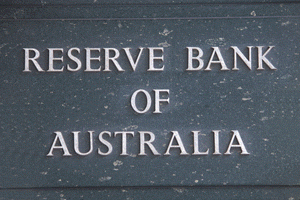
The Reserve Bank of Australia has kept official interest rates across the ditch at 2%, as was expected, following a 25 basis-point cut last month.
The RBA said that having eased monetary policy last month, the board judged that leaving the cash rate unchanged was "appropriate".
"Information on economic and financial conditions to be received over the period ahead will inform the board's assessment of the outlook and hence whether the current stance of policy will most effectively foster sustainable growth and inflation consistent with the target," RBA Governor Glenn Stevens said.
The New Zealand dollar quickly dropped more than half a cent against it's trans-Tasman counterpart, from A93.2c immediately before the announcement to A92.6c shortly after. The Kiwi was hovering just above US71c after hitting close-to five-year lows against the American currency over the long weekend.
Earlier this year it briefly appeared that the Kiwi dollar would reach parity with the Aussie, but that now seems highly unlikely.
The decision by the RBA to hold rates after its monthly review means that a substantial gap continues to exist between interest rates here and in Australia.
Our Official Cash Rate is at 3.5% - though some economists believe it may be cut as soon as next week when the Reserve Bank of New Zealand has its next scheduled review of rates. Economists expecting a cut in NZ rates now include those from the HSBC, who changed their call today (after expecting no change this year) and now anticipate two cuts this year with the first possibly this month.
Last month the RBA dropped its cash rate to 2% from 2.25%, but the statement that accompanied the move was widely interpreted by the market as signalling the end of rate reductions.
Here's the full statement from RBA Governor Glenn Stevens:
At its meeting today, the Board decided to leave the cash rate unchanged at 2.0 per cent.
The global economy is expanding at a moderate pace, but some key commodity prices are much lower than a year ago. This trend appears largely to reflect increased supply, including from Australia. Australia's terms of trade are falling nonetheless.
The Federal Reserve is expected to start increasing its policy rate later this year, but some other major central banks are continuing to ease policy. Hence, global financial conditions remain very accommodative. Despite some increases in bond yields recently, long-term borrowing rates for sovereigns and creditworthy private borrowers remain remarkably low.
In Australia, the available information suggests the economy has continued to grow, but at a rate somewhat below its longer-term average. Household spending has improved, including a large rise in dwelling construction, and exports are rising. But a key drag on private demand is weakness in business capital expenditure in both the mining and non-mining sectors and this is likely to persist over the coming year. Public spending is also scheduled to be subdued. Overall, the economy is likely to be operating with a degree of spare capacity for some time yet. With very slow growth in labour costs, inflation is forecast to remain consistent with the target over the next one to two years, even with a lower exchange rate.
In such circumstances, monetary policy needs to be accommodative. Low interest rates are acting to support borrowing and spending. Credit is recording moderate growth overall, with stronger lending to businesses and growth in lending to the housing market broadly steady over recent months. Dwelling prices continue to rise strongly in Sydney, though trends have been more varied in a number of other cities. The Bank is working with other regulators to assess and contain risks that may arise from the housing market. In other asset markets, prices for equities and commercial property have been supported by lower long-term interest rates.
The Australian dollar has declined noticeably against a rising US dollar over the past year, though less so against a basket of currencies. Further depreciation seems both likely and necessary, particularly given the significant declines in key commodity prices.
Having eased monetary policy last month, the Board today judged that leaving the cash rate unchanged was appropriate at this meeting. Information on economic and financial conditions to be received over the period ahead will inform the Board's assessment of the outlook and hence whether the current stance of policy will most effectively foster sustainable growth and inflation consistent with the target.

We welcome your comments below. If you are not already registered, please register to comment
Remember we welcome robust, respectful and insightful debate. We don't welcome abusive or defamatory comments and will de-register those repeatedly making such comments. Our current comment policy is here.